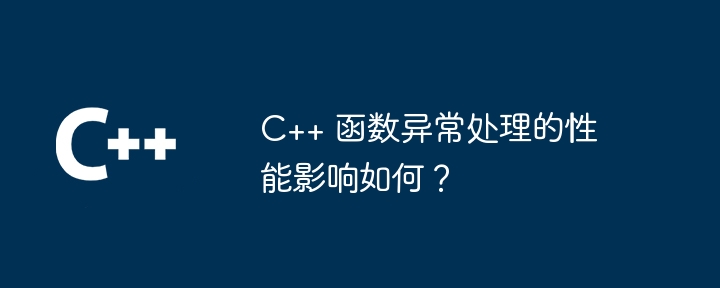
C Exception handling will bring additional overhead, including memory allocation, function call expansion and finding matching catch clauses. These overheads can cause cache misses, affecting performance. To mitigate these effects, it is recommended to limit exception usage, use noexcept specifications, and consider using error codes.

Performance impact of C function exception handling
Introduction
Exception handling is A mechanism in C to handle unexpected errors, but may have an impact on program performance when used. This article explores the potential impact of exception handling on program performance.
Exception handling overhead
Throwing and catching exceptions will bring additional overhead, including:
Cache miss overhead
In some cases, exception handling can cause cache miss overhead. For example:
Practical case
Consider the following code segment:
int divide(int a, int b) {
if (b == 0) {
throw std::invalid_argument("Division by zero");
}
return a / b;
}In this example, if b is 0, An exception will be thrown. However, if b is not 0, the function returns normally.
Using performance analysis tools (such as the Performance Analyzer in Visual Studio), you can observe that the situation where an exception is thrown takes longer to execute than the situation where it is returned normally:
This difference illustrates the performance overhead of exception handling.
Mitigating the performance impact
To mitigate the performance impact of exception handling, consider the following suggestions:
noexcept specification. Conclusion
C function exception handling is a useful mechanism, but it will bring performance overhead when used. It is important to understand these overheads and apply mitigation strategies to optimize program performance.
The above is the detailed content of What is the performance impact of C++ function exception handling?. For more information, please follow other related articles on the PHP Chinese website!
 What are the differences between c++ and c language
What are the differences between c++ and c language
 Recommended learning order for c++ and python
Recommended learning order for c++ and python
 Cost-effectiveness analysis of learning python and c++
Cost-effectiveness analysis of learning python and c++
 Is c language the same as c++?
Is c language the same as c++?
 Which is better to learn first, c language or c++?
Which is better to learn first, c language or c++?
 The difference and connection between c language and c++
The difference and connection between c language and c++
 C++ software Chinese change tutorial
C++ software Chinese change tutorial
 Cost-effectiveness analysis of learning python, java and c++
Cost-effectiveness analysis of learning python, java and c++




